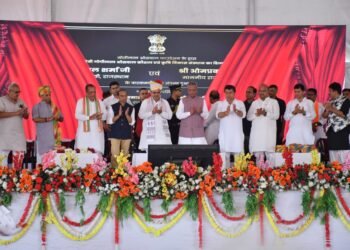In 1927, the British government presented a bill in the Bombay Legislative Assembly to increase the agricultural land of small farmers and transfer it to zamindars.
By Vikas Parashram
We all know that in the past, when a king pleased a person or a minister and gave villages in a jagir as a reward, he became a jagirdar, a feudal lord or a zamindar. But the Brahmins were upper class. Also Dalit Magas succeeded in taking over some small agricultural lands.
The British government had a ryotwari system in which the landlord was responsible for paying rent to the government, if he did not pay the rent he was evicted from the land. Babasaheb Ambedkar himself opposed it when the government introduced an amendment bill to give ryotwari lands to big zamindars. He had said that one day the country will be ruined if the ownership of land continues to increase like this, but the government did not agree to that.
Be it the ryotwari system or any other, in which the small farmers who owned the land did not own it. Maharashtra also had the Khoti system, in Ryotwadis farmers paid taxes directly to the government, but as per the Khoti system, middlemen, also known as Khots, were kept in it. They were free to do anything to collect taxes from the peasants, they used to torture the peasants a lot and sometimes evicted them from the land. For this, Babasaheb Ambedkar himself introduced a bill in the Bombay Legislative Assembly in 1937 to abolish the khoti system and through Ambedkar’s efforts, the khoti system ended and the farmers got their rights.
In 1927, the British government presented a bill in the Bombay Legislative Assembly to increase the agricultural land of small farmers and transfer it to zamindars. Babasaheb Ambedkar protested that agriculture is productive and unproductive depends on its size and not on the labor and capital of the farmer. He had said that the problem will not be solved by increasing the size of agriculture, but this problem can be solved by intensive farming. That is why he advised that cooperative farming should be adopted in general areas. Babasaheb gave the example of adopting cooperative farming in some parts of Italy, France and England.
Dr. Babasaheb Ambedkar suggested the way of cooperative farming for the development of agriculture in India. Dr.Babasaheb Ambedkar wrote an article titled ‘Small Holdings in India and Their Remedies’ in 1918 in which he presented the problems of landholding farmers in scattered areas of India. He said that scattered smallholder farmers are unable to get the expected returns from agriculture due to lack of adequate capital and resources. Hence the need for reforms for the development of agriculture sector in India, the government should provide resources and capital for agricultural activities, his article stated. He explained the nature of collective farming. Here he demanded nationalization of lands.
Today, more than fifty percent of India’s population is engaged in agriculture-related work. In such a situation, handing over Indian agriculture to corporate means leading India to a new slavery. If there is any solution to this crisis, it was suggested by Babasaheb Ambedkar. Provision of capital and resources by the state and promotion of collective farming. For that honest land reform can be the first step in this direction. It was Babasaheb Ambedkar himself in 1946 in a statement to the Constituent Assembly demanding nationalization of land, which is still available today under the title “States and Minorities”. They wanted nationalization of land, education, insurance industry, banks etc. He wanted there to be no zamindars, tenants and landless.
Even in 1954, Babasaheb raised his voice during the debate in parliament for nationalization of land, but the Congress did not listen to him, as the power/authority of India was in the hands of kings, nawabs and landlords. which was headed by a Brahmin and wanted to maintain Brahmin/Savarna supremacy and the economically weaker Dalit-backward and minorities.Babasaheb was as serious about the land issue as he was about other issues that pervaded India. To solve the problems of farmers, Babasaheb also wrote a research paper called ‘Small Holdings in India’ and this research paper is a good solution to today’s worsening agricultural problem, it should be read by people of today.
About the Author

Vikas Parasram Meshram is a social worker and activities working towards the rights of tribal and marginalized communities.























